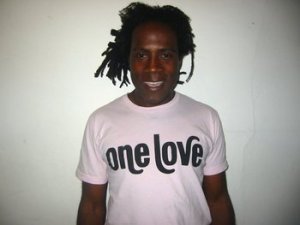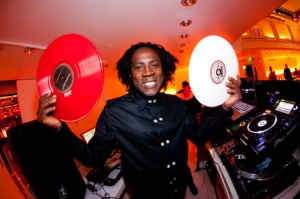FEMI FEM – DJ, PRODUCER, PROMOTER
Femi Fem can probably be linked to most of the UK’s recent musical fabric in one way or another. Apart from being part of the celebrated group Young Disciples – some say the pinnacle of the 90’s acid jazz movement – he has DJ’d in clubs throughout the UK and worldwide, produced and remixed for an eclectic range of international artists, and has famously run a variety of successful club nights in London.
Femi was born in the mid 60’s in London, moved with his family to his ancestral Sierra Leone before returning to London again in 1969.
 Here he shares with us some of his musical influences, explains why parties not clubs are important, and why modern UK music is a result of its evolved ethnicity.
Here he shares with us some of his musical influences, explains why parties not clubs are important, and why modern UK music is a result of its evolved ethnicity.
What are your first musical memories?
Millie Small’s ‘My Boy Lollipop’, ‘Ob-la-di Ob-la-da’ by The Beatles and the first Tighten Up albums on Trojan. Also, my sister loved Marvin Gaye, James Brown and Barry White so I heard them a lot growing up.
DJ, producer, promoter, remixer, writer are only some of the professions that have been designated to you. How would you describe your basic relationship with music?
I’ve always been involved in all of these aspects. I started out as just a dedicated raver – following Steve Walsh, Paul Anderson, George Power and Cleveland Anderson. When I met Norman Jay through my school friend Alec Selby though, it did change my way of thinking. The source of entertainment did seem more tangible and I realised you can try to make a living by just loving music. I also had a substantial moment of musical enlightenment when I went to London’s WAG night-club and heard Barrie Sharpe and Lascelle Lascelles play some James Brown productions. I was likewise inspired by their full range of soul funk rocksteady from the 70’s and select tunes that fitted into that specific sound of the 80’s warehouse party funk scene.
When listening to music do you ever do so just to relax, or do you always have on DJ or producer ‘ears’?
I’d say it depends on the moment or my mind set and this is something that can vary a lot with me. Sometimes it can be a conscious thing, when you’re looking for ideas perhaps, but most of the time music is just being enjoyed.
You have a number of club successes tucked under your belt; it is clear that people enjoy getting together to dance. Do you think in these ultra-modern times it’s all about escapism or do you think we still resonate to ancient traditions of communal dance and celebration of life?
Ancient traditions are still with us yes; we love the idea of letting our minds go in a communal setting. Parties serve that part of us well. Note I say parties not clubs, which as you know can be sterile. I’ve always gone for the party atmosphere; something that’s not necessarily hectic, but has a more friendly, down-to-earth and liberating setting – keeping it real and real funky!
Whilst it is undeniable the musical influences of 20th century Black American music across the globe, do you think that Black UK music and musical traits have made similar impressions?
Yes we do share a sensibility with America, as does all of UK culture. The UK in general shares common traits with the US. Where there’s a clear difference is the mix of immigrants into Britain. The way in which the African, West-Indian and Asian cultures influence and are influenced by the UK in general is distinct, not discarding the way these ethnic groups also integrate between themselves. This unique blend comes through in the music.
The word spirit in ‘We Be Spirits’ refers to the way spirits are considered in some parts of the African continent; beings we are connected to and influenced by but who are not necessarily part of the physical realm. What does the word evoke in you and how do you relate to it?
I think this relates to DNA; it’s how we’re connected to our ancestors, and it can maybe help us get an explanation about who we are.
Although over 20 years old now, for many Road to Freedom is a still-relevant landmark creation. Can you tell us a little about the origins and workings of ‘Freedom Suite’, which I think rings out with the wisdom and depth of an Old Spiritual?
From where I’m coming from it’s a song that was specifically about mental freedom. It’s about not taking on the lot of the underdog. That’s what Mandela did; he fought from a position that said I have the right to lead even though the system hardly acknowledged him, or any other black person, as a human being. He deserved more than freedom. That’s what Carleen says to me in this song.
Are there any exciting projects you can share with us coming up in the near future?
I’m mainly Djing at present. But I’m also working with many young producers and artists so watch this space.
Mixcloud Sessions

